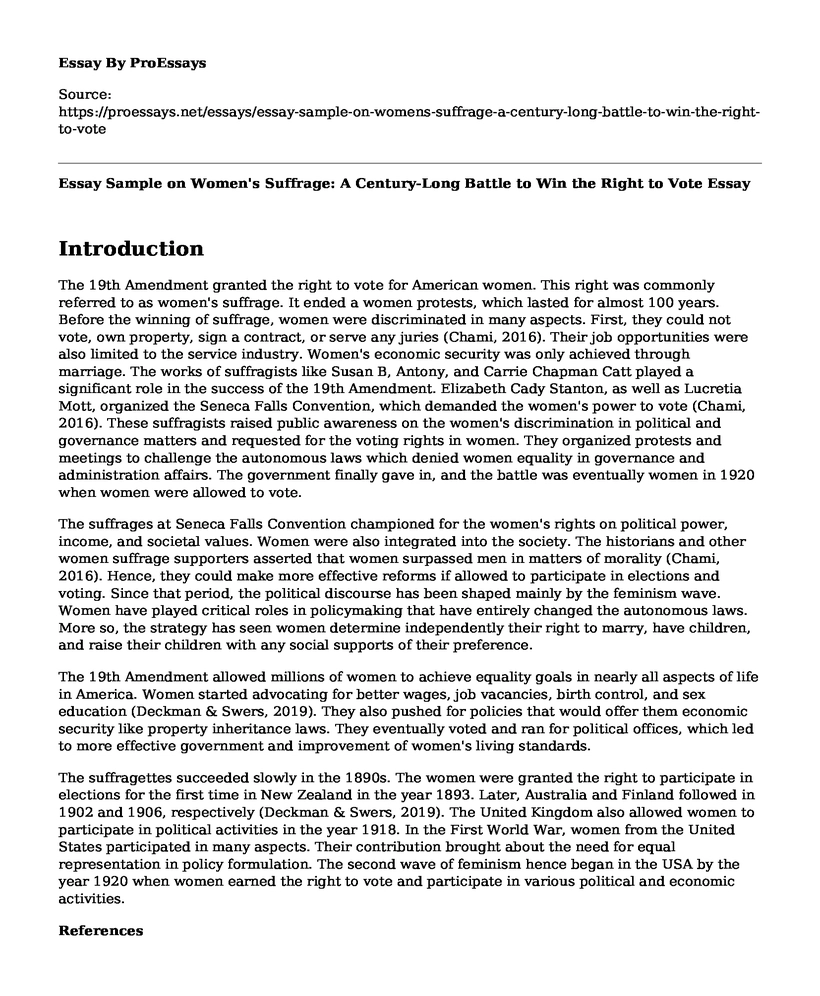Introduction
The 19th Amendment granted the right to vote for American women. This right was commonly referred to as women's suffrage. It ended a women protests, which lasted for almost 100 years. Before the winning of suffrage, women were discriminated in many aspects. First, they could not vote, own property, sign a contract, or serve any juries (Chami, 2016). Their job opportunities were also limited to the service industry. Women's economic security was only achieved through marriage. The works of suffragists like Susan B, Antony, and Carrie Chapman Catt played a significant role in the success of the 19th Amendment. Elizabeth Cady Stanton, as well as Lucretia Mott, organized the Seneca Falls Convention, which demanded the women's power to vote (Chami, 2016). These suffragists raised public awareness on the women's discrimination in political and governance matters and requested for the voting rights in women. They organized protests and meetings to challenge the autonomous laws which denied women equality in governance and administration affairs. The government finally gave in, and the battle was eventually women in 1920 when women were allowed to vote.
The suffrages at Seneca Falls Convention championed for the women's rights on political power, income, and societal values. Women were also integrated into the society. The historians and other women suffrage supporters asserted that women surpassed men in matters of morality (Chami, 2016). Hence, they could make more effective reforms if allowed to participate in elections and voting. Since that period, the political discourse has been shaped mainly by the feminism wave. Women have played critical roles in policymaking that have entirely changed the autonomous laws. More so, the strategy has seen women determine independently their right to marry, have children, and raise their children with any social supports of their preference.
The 19th Amendment allowed millions of women to achieve equality goals in nearly all aspects of life in America. Women started advocating for better wages, job vacancies, birth control, and sex education (Deckman & Swers, 2019). They also pushed for policies that would offer them economic security like property inheritance laws. They eventually voted and ran for political offices, which led to more effective government and improvement of women's living standards.
The suffragettes succeeded slowly in the 1890s. The women were granted the right to participate in elections for the first time in New Zealand in the year 1893. Later, Australia and Finland followed in 1902 and 1906, respectively (Deckman & Swers, 2019). The United Kingdom also allowed women to participate in political activities in the year 1918. In the First World War, women from the United States participated in many aspects. Their contribution brought about the need for equal representation in policy formulation. The second wave of feminism hence began in the USA by the year 1920 when women earned the right to vote and participate in various political and economic activities.
References
Chami, A. (2016). American Women Strife and Suffering for Equal Rights in a Dialectically Changing Society in the 20th Century (Doctoral dissertation).
Deckman, M. M., & Swers, M. L. (2019). Women and Politics: Paths to power and political influence. Rowman & Littlefield.
Cite this page
Essay Sample on Women's Suffrage: A Century-Long Battle to Win the Right to Vote. (2023, Mar 26). Retrieved from https://proessays.net/essays/essay-sample-on-womens-suffrage-a-century-long-battle-to-win-the-right-to-vote
If you are the original author of this essay and no longer wish to have it published on the ProEssays website, please click below to request its removal:
- Terrorist Attack on the Eagles of Death Metal Concert
- Simone De Beauvoir Perspective on Woman as Other
- The Problem of Discrimination Towards the Latino Community Inside the USA
- Essay Example on End Racial Segregation: Fedearal Government Actions to Solve Racism
- Stop Human Trafficking: Modern-Day Slavery and Exploitation - Research Paper
- 2020 Campaign: Exploiting Partisan Divide to Create Division - Free Paper Sample
- The Theme of Civil Disobedience in Melville's "Bartleby the Scrivener" - Essay Sample







